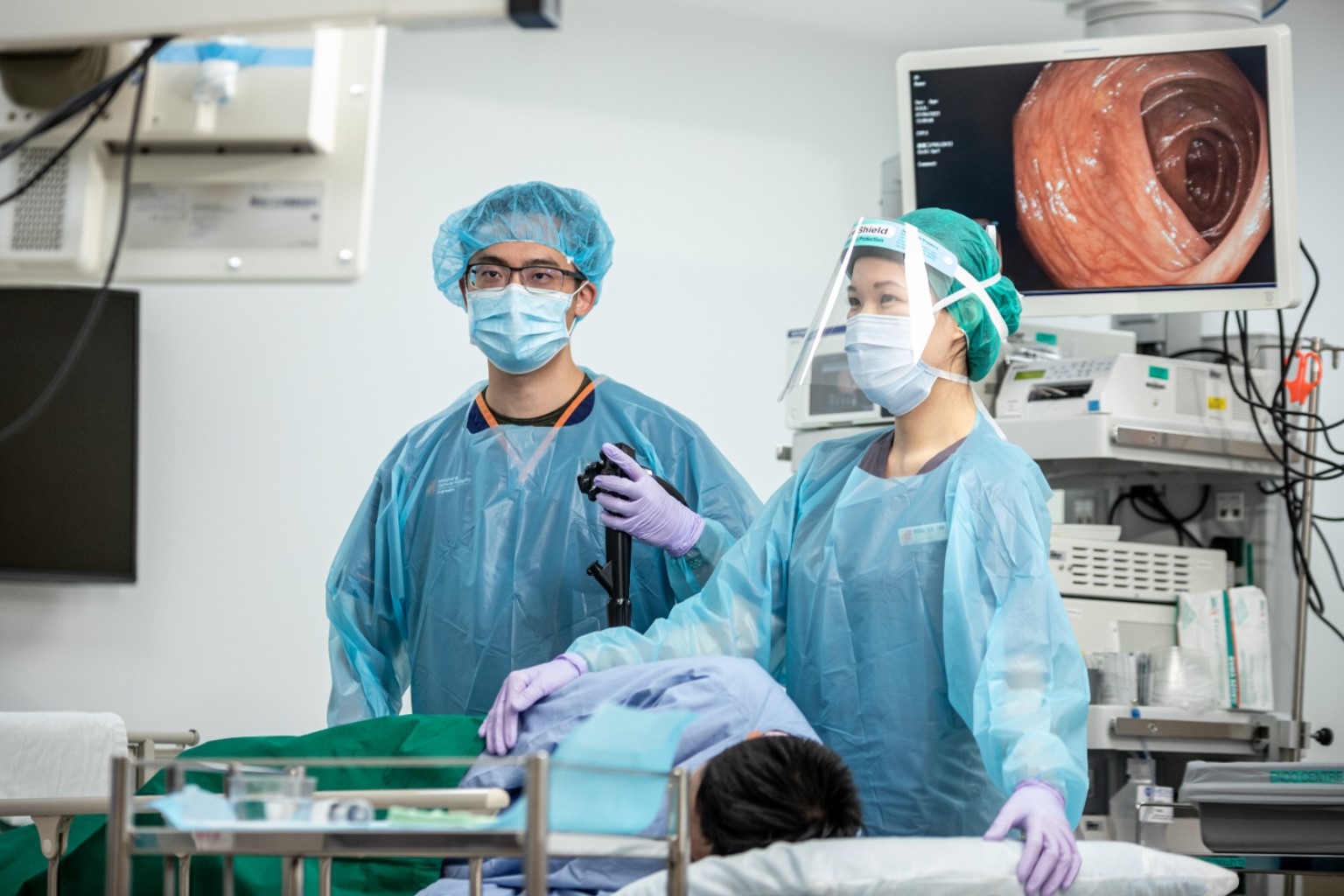BRANDED CONTENT
Early detection of colorectal cancer: How AI-assisted tech can help
Increased precision and clearer imaging can support doctors in diagnosing the disease earlier, says colorectal surgeon Dr Frederick Koh

An AI-assisted colonoscopy can help doctors detect polyps more easily, and with greater accuracy. PHOTO: SENGKANG GENERAL HOSPITAL
Follow topic:
According to the National Cancer Centre Singapore, colorectal cancer is the most commonly diagnosed cancer affecting men in Singapore, and the second most common for women. It may begin in either the colon (large intestine) or the rectum. As colon cancer and rectal cancer have many features in common, they are sometimes referred to together as colorectal cancer.
Making up 95 per cent of colorectal cancer cases, adenocarcinoma is the most common form and often starts as polyps in the cells lining the large intestine. Doctors can screen for polyps during a colonoscopy and may remove them before they turn into cancerous cells.
For Colorectal Cancer Awareness Month in March, Dr Frederick Koh, consultant in the Department of Colorectal Surgery at Sengkang General Hospital shares what you need to know about the disease and the treatments available so that patients can make informed decisions.
Q. How is colorectal cancer detected and is it treatable?
When cells on the inner lining of the colon or rectum grow abnormally, they can produce polyps. While it is natural for cells to grow, divide and die to keep the body functioning properly, polyps may continue multiplying abnormally and mutate into cancerous cells. It may take many years, or even up to a decade, for a polyp to become cancerous and, even then, not all polyps do so. A large majority of polyps and colorectal cancers are asymptomatic until they've become large enough, so screening to remove polyps at an early stage, before symptoms appear, can help prevent the development of colorectal cancer.
The sooner colorectal cancer is detected, even before signs or symptoms appear, the smaller — and more treatable — it is likely to be. In the early stages, colorectal cancer is treatable.
Q. What are some colorectal cancer symptoms?
Signs of colorectal cancer present themselves differently in different patients. Often, those with colon cancer do not notice symptoms in the cancer's early stages and when they do show, the symptoms or signs vary based on the cancer's size and location within the colon or rectum.
Colorectal cancer symptoms may include:
- Abdominal pain or bloating
- Rectal pain or bleeding
- Change in bowel habits
- Weight loss for no clear reason
- Fatigue from anaemia (low red blood cell count)
- Nausea and vomiting
The symptoms of colorectal cancer may look similar to those associated with other medical conditions. Consult your doctor if you notice any of the above symptoms.
Q. How do you usually test for colorectal cancer?
Tests commonly used to screen for colorectal cancer include:
Fecal immunohistochemical test: This test checks for occult (hidden) blood in the stool. It involves placing a very small amount of stool on a set of cards, which is then sent to a laboratory for analysis.
Colonoscopy: During a colonoscopy, a long, flexible tube called a colonoscope is inserted through the anus. It is used to examine the entire rectum and colon for cancer. If anything looks abnormal, the doctor can also take a biopsy (small tissue sample) for further testing or entirely remove small polyps through the colonoscope in the same setting. A colonoscopy is considered the most effective technique to screen patients for colorectal cancer.
AI-assisted colonoscopy: This has been increasingly used worldwide by specialists in colonoscopies as it boosts the polyp detection rate. In Singapore, Sengkang General Hospital is one of the early adopters of this AI-assisted colonoscopy module.
With the AI-assisted function acting as a second observer and highlighting abnormalities in real time, the module’s screening sensitivity helps doctors inspect suspicious areas more closely. Through machine learning and advanced algorithms, abnormalities consistent with polyps are identified. A green box indicates a polyp so small, it might have gone unnoticed by the human eye. This helps greatly with early detection and removal of pre-cancerous polyps, preventing colorectal cancer.

Q. Is AI-assisted colonoscopy safe and accurate?
To ensure that patients get the most out of their colonoscopy, the AI-assisted screening tool is introduced to allow for improved detection of polyps. Every frame captured during the colonoscopy will be assessed and processed in real-time, using the AI algorithm of the program. As a result, the system will automatically and expeditiously alert doctors performing the scope to areas where there might be polyps or cancer. This is especially crucial for flat and small polyps or cancers which can be difficult to identify unaided. Studies have shown that the higher polyp detection rates are, the better colorectal cancer can be prevented1. AI-assisted colonoscopies are safe and do not change the risks of the procedure.
Q. What are some colorectal cancer risk factors?
The risk of colorectal cancer increases with age, but a mix of other health conditions and lifestyle influences can impact colorectal cancer risk factors:
- A family history of colorectal cancer
- Inflammatory bowel diseases such as Crohn's disease or ulcerative colitis
- Age over 50
- A high-fat diet or a diet low in fruits and vegetables
- Obesity or being overweight
- Smoking
Q. Is it true that if I see bloody stools, I am likely to have colorectal cancer?
Finding blood in your stool can be frightening, and it is likely more common than we expect. Bloody stool can indicate something benign, such as a hemorrhoid or piles, or something more worrisome, such as an inflammatory bowel disease or even colorectal cancer.
There are numerous causes for rectal bleeding. If you see any blood in your stool, you should consult a doctor as soon as possible.
Q. When and how often should I go for a colonoscopy?
Colorectal cancer is also one of the most preventable cancers. Yet, people are not going for screening to detect it early at the pre-cancerous stage.
Local and most international guidelines recommend all healthy individuals, without any symptoms of colorectal cancer, to have a colonoscopy at the age of 50. The only proven way of preventing colorectal cancer is early detection and removal of colon polyps before they become cancerous.
Consult your doctor to assess your suitability for a colonoscopy screening if you have a family history of colorectal cancer or experience symptoms like persistent abdominal pain, rectal bleeding, increasing constipation, unexplained weight loss, and a sudden change in bowel habit. You may require a colonoscopy earlier than the averaged-risk individual.

This advertorial is meant for educational purposes only and does not endorse, make reference to and/or recommend any product. This advertorial contains information on service(s) supplied by a third party. Any reference in this advertorial to such third party and/or service(s) does not constitute or imply the endorsement or recommendation of such third party and/or service(s) by the Sengkang General Hospital.
1Corley DA, Jenson CD, Marks AR JR, et al. Adenoma Detection Rate and Risk of Colorectal Cancer and Death. The New England Journal of Medicine. 2014; 370: 2539–2541.


